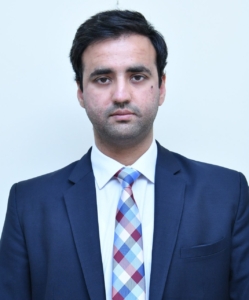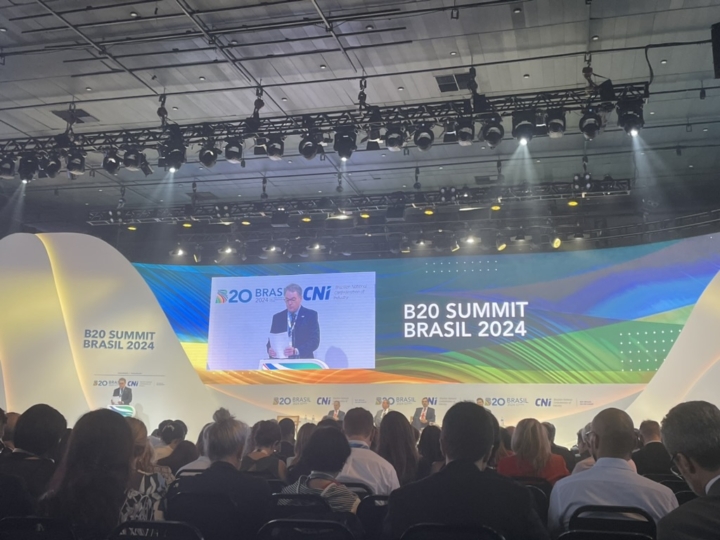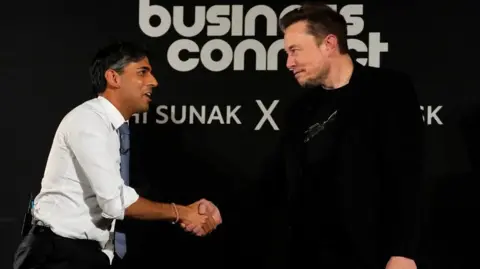Growing up in Jordan, Leen Ajlouni says education changed the trajectory of her life. She was lucky enough to earn scholarships from a young age, helping her earn an engineering degree at Smith College in Massachusetts and, now, helping her fund an MBA from Dartmouth’s Tuck School of Business.
She eventually hopes to work on complex global problems – like fundamental access to quality education for all – while lifting up disadvantaged and low income communities.
Ajlouni took a big step this fall. She was one of three Tuck MBAs to attend and participate in the B20 Summit in São Paulo, Brazil. The summit is the official forum for the global business community within the G20, bringing together business leaders and policymakers to collaborate on pressing economic issues across the globe.
Ajlouni and her MBA classmates – all second-year fellows with Tuck’s Center for Business, Government & Society – served on B20 Brazil’s Trade and Investment Task Force. Tuck was the only business school, and likely the only educational institution, represented at the summit.
“I’m leaving the summit with a commitment to lead with purpose, ensuring that the companies and initiatives I’m part of don’t just seek profit but also contribute meaningfully to society. The summit helped me internalize that the right question shouldn’t be ‘should we do this?’ but rather ‘how do we justify not doing this?’” Ajlouni tells Poets&Quants.
“I was reminded to stay grounded in my values, to take humanity to business, and to hold myself personally accountable.”

Tuck’s three Center for Business, Government & Society fellows pose with Tuck alum and B20 Brazil chairman Dan Ioschpe at the summit this October in São Paulo, Brazil. Courtesy photo
BRINGING TUCK TO THE B20 SUMMIT
Tuck’s Center for Business, Government & Society (CBGS) trains business leaders at the intersections of public, private, and nonprofit sectors. Through it, MBAs and other Tuck students engage with issues like corporate social responsibility, sustainable business practices, public-private partnerships, and the role of government in economic development through special programming, workshops and forums, fellowships, and guest speakers. It emphasizes both experiential learning and real-world impact.
The opportunity to partner with the B20 Summit was made possible through one of Tuck’s other major selling points: Its global network of highly successful and highly engaged alumni.
Dan Ioschpe, Tuck MBA Class of 1991, is a prominent businessman in Brazil and chairman of Iochpe-Maxion, a global producer of automotive wheels and structural components. When Tuck Dean Matthew Slaughter learned Ioschpe was serving as the chairman of Brazil’s B20 summit, he reached out looking for ways Tuck could collaborate. Ioschpe was happy to help, and Tuck was named a Network Partner for the B20 Trade and Investment Taskforce.

Hannah Payson, executive director of the Tuck Center for Business, Government & Society
“The summit provided unparalleled access to global business leaders, real-time discussions on critical economic and sustainability issues, and firsthand exposure to the intricacies of international collaboration. Few MBA programs offer such a direct connection to influential forums like the B20, and the experience underscored the importance of multilateral cooperation in addressing global challenges,” says Hannah Payson, executive director of the Tuck Center for Business, Government & Society. Before joining Tuck, she spent a decade at Lloyd’s of London as a corporate social responsibility manager.
“The significance of this opportunity lies not only in the caliber of the event but also in the way it exemplifies the strength of Tuck’s network. Thanks to the initiative of alumnus Dan Ioschpe, these students gained invaluable insights and connections that will continue to shape their perspectives and careers.”
At its core, the B20 bridges the global business community and the Group of Twenty, the international forum for governments and central bank governors from 19 countries as the European Union. Formed in 1999, the G20’s mission is to promote international financial stability and sustainable economic growth. Member nations represent about 75% of global trade and two-thirds of the world’s population.
The B20 (standing for Business 20) meets each year as part of the G20 process, facilitating dialogue between the business community, governments, and policymakers. A primary goal is to provide concrete policy recommendations on crucial global issues to influence G20 leaders.
“Attending B20 Brazil as a Tuck delegate was a valuable experience. As the youngest and only business school representatives, we were humbled to engage with leaders shaping the economic development agenda of countries that comprise 85% of the Gross World Product ,” says Saad Shaukat, MBA ‘25, and CBGS fellow.
“A key takeaway was the private sector’s essential role in advancing sustainable development. Brazil’s G20 leadership stood out, with a strong focus on social inclusion, energy transitions, and governance reform, emphasizing the interconnectedness of economic and social progress. “
BRIDGING THE DISCONNECT BETWEEN BUSINESS AND GOVERNMENT
Over the course of the two-day summit, the three Tuck MBAs attended high-level plenary sessions alongside policymakers from Brazil and other G20 countries. They participated in discussions on a fair net-zero energy transition, the impact of AI integration on the future of work, and leveraging trade to tackle global poverty. As a Network Partner, Tuck leveraged its technical expertise by sharing insights, and supporting the dissemination and advocacy of the B20’s policy recommendations.

Zac Seeber, MBA ’25
The MBAs heard from guest speakers like Paul Polman, the former CEO of Unilever, and met with business leaders from around the world. Francisco Gomes Neto, CEO of Embraer and chair of the Trade and Investment Taskforce, summarized the taskforce’s core message this way: “Trade is everything.”
Zac Seeber, MBA ’25 and CBGS fellow, says the experience was a powerful reminder of the interconnectedness of the global economy.
“The event highlighted the potential of multilateralism – countries working together to tackle complex, shared challenges – especially at a time when many are leaning toward protectionist and isolationist policies,” says Seeber who was an officer in the United States Air Force for six years, serving in locations across the United States, Saudi Arabia, Kuwait & Djibouti. The summit reinforced the notion that this interconnectedness is what drives the global economy. It also means that the consequences of one country’s policy rarely stops at its borders.
“In a world facing global issues like climate change, economic instability, and supply chain disruptions, such cooperation is not only promising but essential.”

Saad Shaukat, MBA ‘25
Pakistani government as well as a project manager for governance initiatives for the Office of the President. He wanted an MBA program where he could build on his public sector experience while gaining practical skills to address global challenges. Tuck’s close-knit community and focus on experiential learning was exactly what he was looking for.
“The B20 experience broadened my perspective on global economic challenges, highlighting the need to align economic policies with the political capital required for incubating sustainable partnerships,” Shaukat says.
“I gained a deeper appreciation for balancing national interests with multilateral collaboration, recognizing how prioritizing economic cooperation can be crucial for navigating complex geopolitical dynamics. This realization feels particularly relevant given my experience coming from South Asia, one of the world’s least economically integrated regions.”
After graduation next year, Shaukat plans to continue a career in public service with a focus on international development.
“The B20 experience highlighted the disconnect between government policies and private sector needs. Having worked within the Government of Pakistan, I’m motivated to bridge this gap by implementing policies that foster entrepreneurship, reduce barriers, and promote sustainable, inclusive growth.”

The B20 Summit Brazil brought together delegates from 71 countries, including nearly 2,000 participants, 56 expert speakers, and 11 panels. Courtesy photo
EQUITY THROUGH EDUCATION
“Tuck is a place where people embrace their unique identities, co-invest in each other’s success, and leave behind a meaningful legacy,” she tells Poets&Quants. “I think it’s the nature of the people who choose to come here that makes Tuck a place that always feels like home.”
Her fellowship with the Center for Business, Government & Society has been a defining factor of Tuck MBA. She wants to work at that intersection, leveraging her business training to drive inclusive and sustainable economic growth, especially in developing countries like her native Jordan.
Her experience at the B20 helped focus her future aspirations.
“The B20 Summit is significant because it provides an opportunity to align the priorities of the global business community with the agendas of G20 leaders, fostering a collaborative approach to challenges that no single entity can solve alone. The summit underscores the urgency of moving beyond fragmented, rearview mirror-thinking to embracing forward-looking, inclusive, and sustainable policies. It serves as a powerful reminder that in an increasingly interconnected world, our challenges – and our solutions – are shared,” she says.
Seeing first hand the power of collective action strengthened her drive to tackle global challenges with both urgency and pragmatism. She left motivated to work on cross-sector solutions to issues like the future of work and equitable access to education.

Leen Ajlouni, MBA ’25
Within the next five years, nearly a quarter of jobs will undergo transformation, with approximately 83 million jobs lost and 80 million new jobs emerging. Businesses and organizations will need to reskill and upskill their workforce.
“As I absorbed these discussions, I felt a renewed passion for the idea of inclusive, equitable education as a fundamental lever for a better society. There was an urgency to bridge the digital divide and foster digital inclusion, ensuring that no one is left behind. I left the summit with a powerful realization: it is a global imperative to cultivate a mindset that values education and lifelong learning, not just as a pathway to employment, but as a foundation for personal empowerment and collective progress,” she says.
Ajlouni is joining Boston Consulting Group as a management consultant. Ultimately, she wants to tackle economic and societal challenges through an educational lens. She hopes to return to Jordan to start and lead organizations with high-impact missions.














